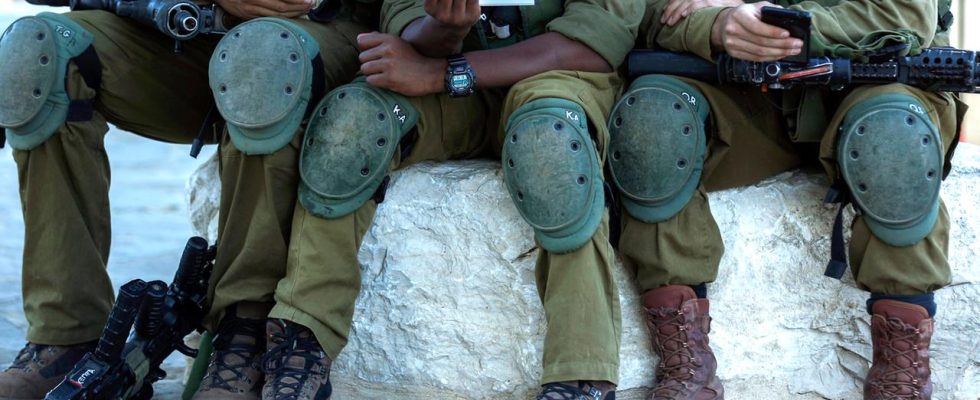For months, Israeli soldiers have been posting videos of their operations in Gaza that show how inhumanely they sometimes treat Palestinians. The army speaks of isolated cases.
A few months ago a TikTok video went viral. It shows two Israeli soldiers in a bulldozer demolishing the remains of a house in the Gaza Strip. The two soldiers send greetings to the Israeli singer Eyal Golan. “We love you,” says one of the soldiers, “we are in Khan Yunis, we dedicate this house to you for the joy you bring us.”
Eyal Golan said after October 7 that the whole of Gaza must be wiped out and not a single person should be allowed to stay there. The TikTok video in which the soldiers celebrate this statement while demolishing houses was mentioned by South Africa in the case against Israel at the International Court of Justice. South Africa accuses Israel of committing genocide, which Israel firmly rejects.
Videos are a huge image problem
The social media posts are partly celebrated by Israeli users. The videos have become a huge image problem for Israel, which claims to have the most moral army in the world.
Smoke from a fire can be seen in another video. A man says in Hebrew: “Oh, Gaza is burning. May you burn alive, you bitches.”
In another video, a soldier appears to be searching an abandoned apartment and found a woman’s underwear. “I’ve always said that Arab women are the biggest sluts there are,” says the man. Other videos show possible looting by Israeli soldiers. There are also recordings of Israeli soldiers setting houses on fire.
“War against the idea of one Palestinian Nation”
The Palestinian journalist Younis Tirawi has been collecting the videos for months and says he has verified them. He analyzed the social media profiles of hundreds of Israeli soldiers. Tirawi’s verdict: The videos showed that it was not about a war against Hamas. “It’s about a war against the idea of a Palestinian nation and our existence.”
For example, an Israeli soldier filmed himself blowing up buildings north of Gaza City. He then shouted: “So that they no longer have a place to go back to.”
On October 7, Hamas and Islamic Jihad carried out serious terrorist attacks against Israel. 1,200 people were murdered and hundreds were kidnapped in the Gaza Strip. Israeli journalist Emanuel Fabian is a military correspondent for the Times of Israel newspaper. Looking ahead to October 7th, it was a very emotional war, says Fabian. Some soldiers could definitely have feelings of revenge. But that is problematic.
He himself has been traveling with Israeli troops in the Gaza Strip several times since the beginning of the war. Conscripts, reports Fabian, usually have to hand over their cell phones. The army is less strict with reservists. Before the war, the Israeli army did punish soldiers who published videos. But now the army is far too focused on fighting and less on discipline. In addition, the army needs many of these soldiers and cannot punish them en masse.
Degrading photos as a message to Hamas?
But there also seem to be commanders who approve of some of the videos. In December, photos and videos emerged of handcuffed Palestinians in northern Gaza. They wore only their underpants and were blindfolded.
Military correspondent Fabian suspects that the videos were published by middle-ranking commanders. They wanted to send a message to Hamas: “Look, we captured your men. In a humiliating way.” In many cases, says Fabian, the men were not fighters for Hamas or other terrorist groups.
Right-wing extremist parts of the government are inciting
Only a few Israeli journalists, former soldiers and scientists want to go ARD-Make inquiries about the videos. In times of war, there is concern that criticism will stab the soldiers in the Gaza Strip in the back. Jair Golan agreed to give an interview. He was formerly the deputy chief of general staff of the Israeli army. Today he is a politician and the hope of the Israeli political left, which is in decline. Golan says he understands why hardly anyone wants to speak critically about the soldiers’ videos. After all, these are times of crisis. But: “If we want to deal better with this ongoing crisis, we have to realign our moral compass,” he says.
He is ashamed of the videos. The impact on Israel’s reputation is terrible. Golan is convinced that only a small minority of soldiers in the Gaza Strip behave immorally. This minority, Golan sees it, is being spurred on by Israel’s partly right-wing extremist government: “Let’s assume a soldier has extreme ideas. If there is a clear message that his behavior is not accepted, he will follow the rules Keep the army.”
But these soldiers are currently receiving support from the extreme sections of society. “And then this soldier thinks it’s okay to go to war to get revenge.”
The military speaks of isolated cases
In a statement, the Israeli army wrote that the videos were isolated cases that deviated from orders and the values of the Israeli army. In several cases, reservists were suspended from army service.
“The Israeli army investigates such incidents and responds with command and disciplinary measures,” the army said. “If there is any suspicion that crimes have been committed, the military police will investigate.”
Palestinian journalist Younis Tirawi does not believe the videos are isolated cases. And he doubts that the army is serious: even more videos have been posted in the past few weeks than in previous months.
Benjamin Hammer, ARD Tel Aviv, tagesschau, March 10, 2024 10:29 p.m

